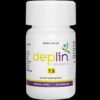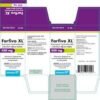What is desvenlafaxine?
desvenlafaxine
Get Now
How Desvenlafaxine Works
Desvenlafaxine increases the levels of serotonin and norepinephrine, two neurotransmitters that play key roles in regulating mood. By inhibiting their reuptake in the brain, it helps to enhance mood and emotional well-being.
Uses
- Major Depressive Disorder: Desvenlafaxine is primarily prescribed for MDD, helping patients manage their symptoms effectively.
- Anxiety Disorders: While not officially approved for this use, some healthcare providers may prescribe it off-label for anxiety disorders due to its effects on mood.
Dosage and Administration
Desvenlafaxine is available in extended-release tablet form. The usual starting dose is 50 mg once daily, which can be adjusted based on the individual’s response and tolerance. It’s essential to follow the prescribing doctor’s instructions and not to discontinue the medication suddenly to avoid withdrawal symptoms.
Side Effects
While desvenlafaxine is effective for many, it may cause side effects, including:
- Nausea
- Dizziness
- Dry mouth
- Insomnia
- Increased sweating
Some patients may experience more serious side effects, such as changes in blood pressure, serotonin syndrome, or allergic reactions. Regular monitoring by a healthcare provider is essential to manage any adverse effects.
Considerations
- Medical History: Inform your healthcare provider of your medical history, particularly if you have a history of high blood pressure, heart issues, or liver problems.
- Drug Interactions: Desvenlafaxine can interact with other medications, including certain antidepressants, blood thinners, and medications for migraine. Always discuss your full list of medications with your doctor.
- Pregnancy and Nursing: If you are pregnant, plan to become pregnant, or are nursing, discuss the risks and benefits of desvenlafaxine with your healthcare provider.
- Monitoring: Regular follow-ups are crucial to evaluate the effectiveness of the treatment and make necessary adjustments.
Conclusion
Desvenlafaxine can be an effective treatment option for those struggling with major depressive disorder. By understanding its uses, potential side effects, and considerations, patients can work closely with their healthcare providers to optimize their treatment plan. As with any medication, open communication and monitoring are key to ensuring the best outcomes.



